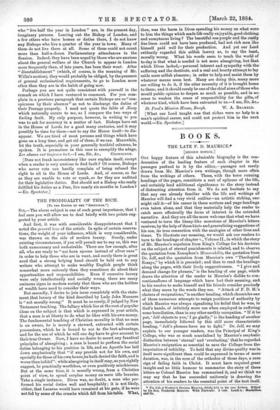THE PRODIGALITY OF THE RICH.
LTO THE EDITOR OF VIZ " SPECTATOR..9
Sia,—The above subject is one of such great importance, that I feel sure you will allow me to deal briefly with two points sug- gested by your article.
And first, it was with considerable disappointment that I noted the general tone of the article. In spite of certain reserva- tions, the weight of your influence, which is very considerable, was thrown on the side of modern luxury. Surely, under existing circumstances, if you will permit me to say so, this was both unnecessary and undesirable. There are few enough, after all, who are ready to "use horn spoons instead of silver ones" in order to help those who are in want, and surely there is great need that a strong helping hand should be held out to any writers who attempt to make wealthy English people think somewhat more seriously than they sometimes do about their opportunities and responsibilities. Even if excessive luxury were only intellectually and socially wrong, there are many ominous signs in modern society that those who are the holders of wealth have need to consider their ways.
But secondly, I desire to join issue completely with the state- ment that luxury of the kind described by Lady John Manners is "not morally wrong." It must be so surely, if judged by New Testament teaching. The fallacy which lies at the root of popular ideas on the subject is that which is expressed in your article, that a man is at liberty to do what he likes with his own money. The fundamental teaching of Christian morality is that no man is an owner, he is merely a steward, entrusted with certain possessions, which he is bound to use to the best advantage, and for the use of which he will one day have to give account to their true Owner. Now, I have no desire to assert any fanatical principles of almsgiving ; a man is bound to perform the social duties belonging to his position in life, and an Apostle has laid down emphatically that "if any provide not for his own, and specially for those of his own house, he hath denied the faith, and is worse than infidel": while almsgiving in itself may, as you rightly suggest, be practically worthless, or even positively mischievous. But at the same time, it is morally wrong, from a Christian point of view, to spend surplus money on mere idle luxuries. Take a single instance. Dives was, no doubt, a man who per- formed his social duties well and hospitably; it is not likely, either, that Lazarus would have remained at his gate, if he were not fed by some of the crumbs which fell from his table. What, then, was the harm in Dives spending his money on what were to him the things which made life really enjoyable, good clothing and sumptuous living P The beautiful sea-purple and the costly fine linen could not have been produced, had not rich men like himself paid well for their production. And yet our Lord. evidently regarded this selfish luxury as, to say the least, morally wrong. What his words seem to teach the world of to-day is that what is needed is not mere almsgiving, but that which Dives lacked,—personal interest and sympathy with the suffering and the destitute, and a real and hearty attempt to lay aside mere selfish pleasure ; in order to help and assist them by whatever means seem best. Many are doing this, many more are willing to do it, if the utter necessity of it is brought home to them; and it should surely be one of the chief aims of those who. mould public opinion to deepen as much as possible, and in no. sense to weaken the sense of responsibility for the gifts, of whatever kind, which have been entrusted to us.—I am, Sir, &c.,.
St. Paul's Mission House, Burgh. W. A. BRIMELD.
[What our Lord taught was that riches were no help to a man's spiritual career, and could not protect him in the next world.—En. Spectator.]


































 Previous page
Previous page